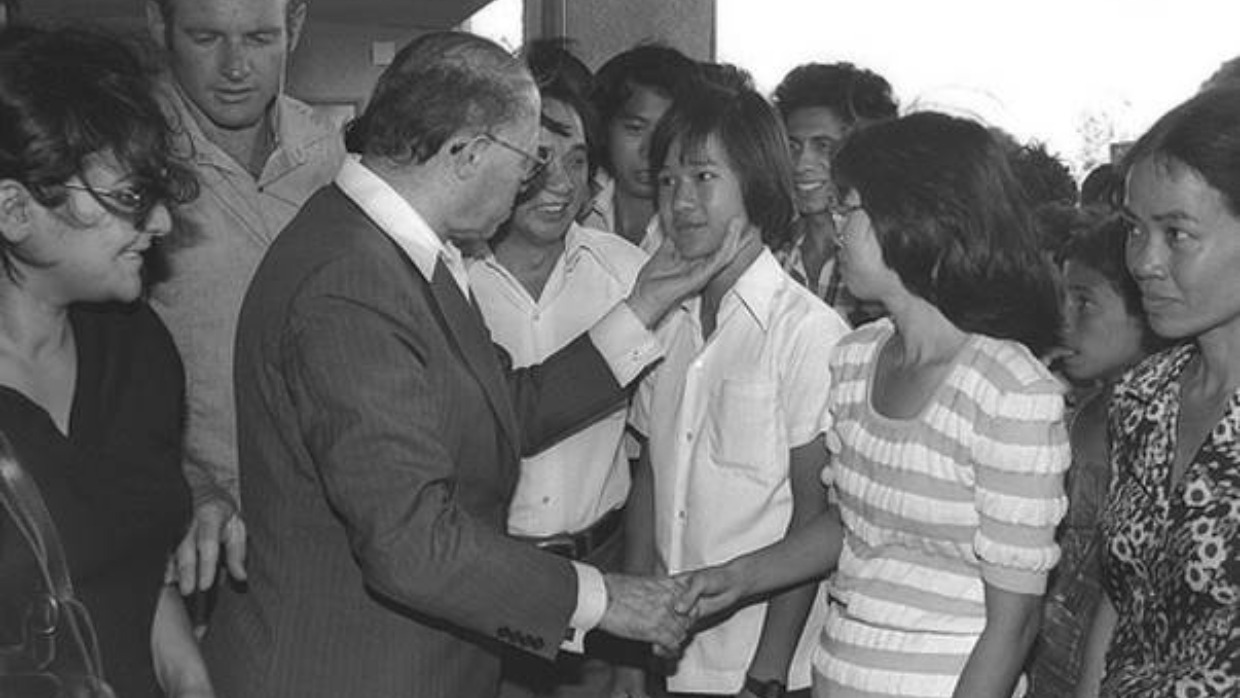 Vampire Weekend's Surprising Jewish Stories
Vampire Weekend's Surprising Jewish Stories


5 min read
Even though Israel was barely able to support its own economy, he felt it was the right thing to do.
On April 30, 1977, soldiers of the Kampuchean Revolutionary Army attacked Vietnam. Over the following months, thousands of civilians were killed and many more fled in boats, seeking refuge from the war.
A few weeks later, an Israeli ship received an SOS message while sailing in the South China Sea. Many ignored the call, but the Israeli ship did not. The captain, Meir Tadmor, brought aboard 66 Vietnamese men, women and children who were found with almost no food or water.
Ten days later, Menachem Begin was sworn in as Israel’s Prime Minister and began his confirmation speech with the following:
My first action as prime minister tomorrow will be to instruct that asylum be granted to the Vietnamese refugees. We all recall the ships of Jewish refugees in the 1930s which wandered the seven seas, seeking entry to a specific country or various countries, and were denied access everywhere. Now there is a Jewish state. We have not forgotten. We will act humanely. We will bring those unfortunate refugees here to our country after our ship has saved them from drowning, and we will grant them a haven...1
Begin felt that protecting their human rights was the first thing he should do as Head of State, and Israel became the first country in the world to accept refugees from this war-torn country.
 Newly arrived refugees being greeted at Ben Gurion Airport by fellow Vietnamese already in Israel, January 24, 1979 (Moshe Milner/Government Press Office)
Newly arrived refugees being greeted at Ben Gurion Airport by fellow Vietnamese already in Israel, January 24, 1979 (Moshe Milner/Government Press Office)
In Judaism, the good deeds that are commanded cater to both the rights of others and responsibilities we each have.
If my focus is on the rights of someone else, I must make a value judgment about their plight, their needs, and how helping them will impact me. If my focus is on my responsibilities, I must help others because it is my obligation. It is not an act of altruism, for helping others is what allows me to fully express my humanity.
Human rights are sometimes viewed as optional depending on how they affect all parties, whereas responsibilities come from a sense of duty even if it doesn’t suit. Begin accepted Vietnamese refugees into a tiny country of 3.5 million people, barely able to support its own economy, because he felt it was the right thing to do.
#Begin accepted Vietnamese refugees into a tiny country of 3.5 million people, barely able to support its own economy, because he felt it was the right thing to do.
This is clearly expressed in the Book of Genesis with the first two children ever born: Cain and Abel. The Torah describes how Cain became jealous of Abel and wanted to harm him. God didn’t tell him to spare Abel because he had a right to life, but rather, because it was the wrong thing for him to do.2
After Cain murdered his brother, God prodded his sense of responsibility and he answered with the infamous rhetorical question, “Am I my brother’s keeper?”3 “Yes,” is the unstated answer, “you are absolutely responsible.”
In fact, the foundation of our obligation to others begins with the creation story when humankind was created “in the image of God.”4
The Talmud states that Adam was created alone to teach that each person is an entire world.5 Rabbi Ahron Soloveichik wrote:
This key concept of the dignity of all human beings constitutes the basis of human rights. The maxim of “Man was endowed by his Creator with certain inalienable rights” was not an innovation of the founders of the American republic. These men were impressed with the doctrine of human rights which flows naturally from the concept of “the dignity of man” and the “image of God in which He created Man,” as they knew from their Biblical background.6
This version of human responsibilities rather than just rights continued beyond the birth of humanity into the birth of the Jewish people. Forged in the crucible of Egyptian slavery, the nation and its laws strongly reflected concern for the well-being of others, especially the weak and downtrodden. Time after time, Judaism enjoins Jews to care for foreigners, orphans, widows, the poor and more. Because my responsibility to care for others stems from a sense of duty.
If my concern was about the rights of someone else, surely my own rights would come first. But if it is my responsibility, I must act regardless of how difficult it is to do so.
When the Israelites accepted the Torah, they embraced the values of caring for others, protecting the defenseless and human rights. While of course, there are other considerations and complexities, these values, ensuring we care for and protect others, have remained fundamental to Judaism for more than 3,000 years. This sits at the heart of human rights from the beginning and continues to inform Jewish responsibilities every day.
Rabbi Dr. Benji Levy is a cofounder of the philanthropic advisory Israel Impact Partners, Keshev mental health center, and an Al summarizing start-up called Tanna. He is the former CEO of Mosaic United and Dean of Moriah College, and he teaches globally in person and online at @RabbiBenji. For more information visit www.rabbibenji.com
